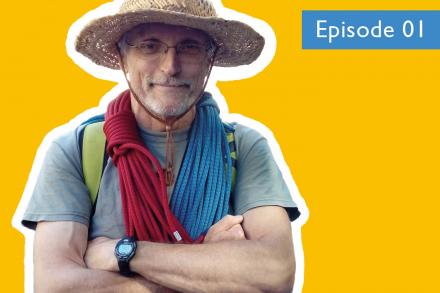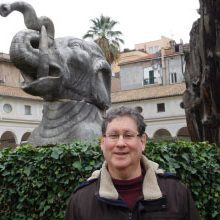The People behind the Learning Portal: Nicolas Kovacs, French translations

Linux Professional Institute (LPI) launched the Learning Portal in June 2019. The Learning Portal is the repository of all the Learning Materials for our exams. The whole project is managed by Dr. Markus Wirtz, manager Education Programs at LPI. We designed it as an international endeavour – learning is easier in your mother tongue! – hence we needed a team of authors, editors, and translators to design, write, and localize the body of lessons.
This series of interviews is a journey toward knowing better the People behind the Portal: the Linux and Open Source enthusiastic professionals who are making the Learning Portal possible.
By reading this series of interviews, you will know more about Contributors’ work, the peculiarities of translating IT educational material, and the challenges Contributors have to face restoring what could be lost in translation. And about why working on the Learning Portal is quite cool and nerdy.
And if all this sounds interesting and you want to join us, we would be happy to receive your feedback at learning@lpi.org.
What is your academic and professional background?
I do a lot of writing on free and open source topics under the pen name Kiki Novak. Although I am translating LPI Learning Materials into French, my first language is German. I now live in Montpezat, in the Nîmes district in the south of France
When, and how, did you decide to use your skill in developing learning materials for Linux Professional Institute?
I came to be an LPI translator through a very unusual route. I have never taken an LPI exam (although I had once considered doing so). Instead, I discovered the learning materials while doing research for some of my own writing, as discussed in a https://blog.microlinux.fr/traductions-lpic/ blog posting in French. I realized that the LPI learning materials were much better than typical free online content, and decided to benefit fellow coders by translating them into French. I started working with the LPI office at that point.
What is your contribution, so far, to the Learning Portal, and what’s next for you in this project?
I have translated the first lessons of the LPIC-1 exams in French and will finish the complete 101 learning materials in summer.
As a certified professional and a developer of learning materials, you are familiar with both sides of the coin. What advice, therefore, would you give to those people who are studying for their LPI Exams?
“All theory is gray, my friend. But forever green is the tree of life.” (Goethe, Faust)
Learning Linux is not about answering multiple choice exams, so my advice is: get your hands dirty. Get comfortable with the usual suspects among Linux distributions. Install them using VirtualBox, Vagrant, or real hardware. Play with them like a kid playing with their Lego construction set. And most important: have fun!
The LPI Learning Portal is a community too. What is your experience with this community so far? What tools and features do you use in the process? What can you tell us about workflow? And what “opensourceness” can you recognize in a project that is about education?
I’m a newcomer in the LPI team, so my experience is very recent. There are some quite impressive talents around here. When I translated all the biographies, I stumbled over Andrew Mallett’s Urban Penguin project, which is really nice. My tech reviewer is Mickael Rigonnaux, a former student of mine and a brilliant guy whom I brought along to the project. The common denominator here is that when all is said and done, we’re simply folks eager to share our passion and our competence with the community, a bit like the old ladies in my village sharing recipes for pumpkin soup among themselves.
When I started to work on the translations, I had to get acquainted with OmegaT, a nifty keep-it-simple translation memory tool that I’m already quite comfortable with. Kudos to Markus Wirtz, whose job seems to boil down to herding cats. Fortunately we can rely on Git, another great piece of software provided by Linus Torvalds, to manage all that under the hood.
What are the specific hurdles you have to deal with while translating the Learning Materials in your mother tongue language? What are the possible “lost in translation” issues?
I don’t really see any hurdles, but this is probably due to my background. I’m fluent in three languages, I’ve already published five tech books in French in the same area of expertise for which I’m translating (that is, Linux system administration), and in the late nineties I worked as a translator for some time.
So no hurdles, just fun.
What is your personal experience of the FOSS and Linux experience in your country?
As a global project, FOSS/Linux doesn’t really have any national boundaries. But a few specifics apply to France. When I started using Linux 20 years ago, the most popular distribution here in France was Mandrake Linux, which was later rebranded to Mandriva. Back in those days, I even bought the boxed release sets, which were sold for about 50 to 60 euros and contained a printed handbook.
One notable French detail: the police force (Gendarmerie Nationale) uses Linux on most of their 90.000 desktops.
How do you see the impact of your work with the LPILP Team, and the development of projects such as the Learning Portal, in your Country in a few years?
I think this will benefit a lot of people. When the first three lessons were published in French, I wrote a little article in my tech blog, mentioned already (https://blog.microlinux.fr/traductions-lpic/), which was shared in the “Journal du Hacker” and later the “Courrier du Hacker”. I know as a fact from the stats page of my tech blog that technical information about Linux gathers quite a lot of visitors, the more so if it’s solidly put together.
